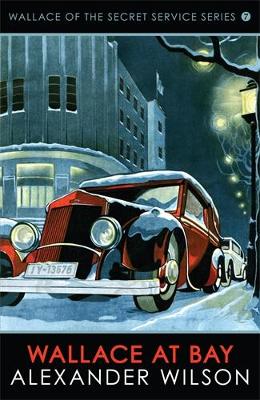Reviewed by brokentune on
"Of course I don't know the district very well," Carter told her, "but it has struck me whenever I've been round this way, that the first house on this side - the one next door to the school - is about the most decayed of the lot. I suppose it is owned by the same landlord, isn't it?"
"Lord bless you, no! There's umpteen landlords own these houses and, if you ask me, they're all as bad as one another. Letting the places go to rack and ruin, that's what they're doing, but I don't suppose they care as long as they get their rent."
"Still," persisted Carter, "tidy tenants can improve even dilapidated houses by growing flowers in the front, banging up clean curtains and that sort of thing. The people in the house of which I am speaking don't seem to have any of what you might describe as home pride."
"Home pride!" snorted the lady behind the bar. "I should think not indeed. Do you know who live in that house?"
He smiled. "No, I'm afraid I don't."
"Foreigners, all the blesses lot of them. And what can you expect from foreigners?"
This is not the only instance - when the officials raid the house to arrest a bunch of "anarchists", the flat is described as a filthy hovel, but what else could one expect?
There are other issues, too:
The "anarchists". This book was written in 1938. It does not seem to make sense to have "anarchists" as villains. To me this plot would have made more sense if it had been set pre-WWI, but it clearly isn't because the Cenotaph features in the plot.
In the second half of the book, Wilson seems to equate "anarchism" with "Bolshevism", which is not strictly true either. It would make more sense if he had focused on "Bolshies", but then why would their efforts be limited to the assassination of royalty?
Of course, all of the villains, all of the "anarchists", are "foreigners" and the general description of the generalised "foreigners" is pretty harsh, and just ...stupid, including the made up accents, which seem to be all the same.
Wallace of the Secret Service is a pretentious snob, who is portrayed as the adored hero of all his underlings and the personal enemy of all villains everywhere. This is again ... ill-conceived.
Wallace does lead the operation but the actual story follows Carter, an agent who is at the forefront of all the action. Wallace hardly does anything in this book. It makes no sense for Carter or anyone else to focus on the amazing Wallace, when they're the ones solving all the puzzles. Holy sycophantic hero worship, Batman!
It all read like a boy's own adventure story - which it was. Literally. Apart from the two women discussing foreigners with Carter, there is only one mention of another. She doesn't even feature in the story, she is only mentioned! And in that mention, Carter, Wallace and the boys question her ... morals? ... for having a child by the evil chief villain ... who is a dwarf.
I originally gave this story 2* but that was generous. It may been motivated by a sense of curiosity of whether Ian Fleming was aware of this series, because he also loved to display his villains as ugly, degenerate, perverted, or otherwise ... different.
In all earnest, tho, I cannot wait to remove the book from my shelves.
Reading updates
- Started reading
- 31 January, 2018: Finished reading
- 31 January, 2018: Reviewed
